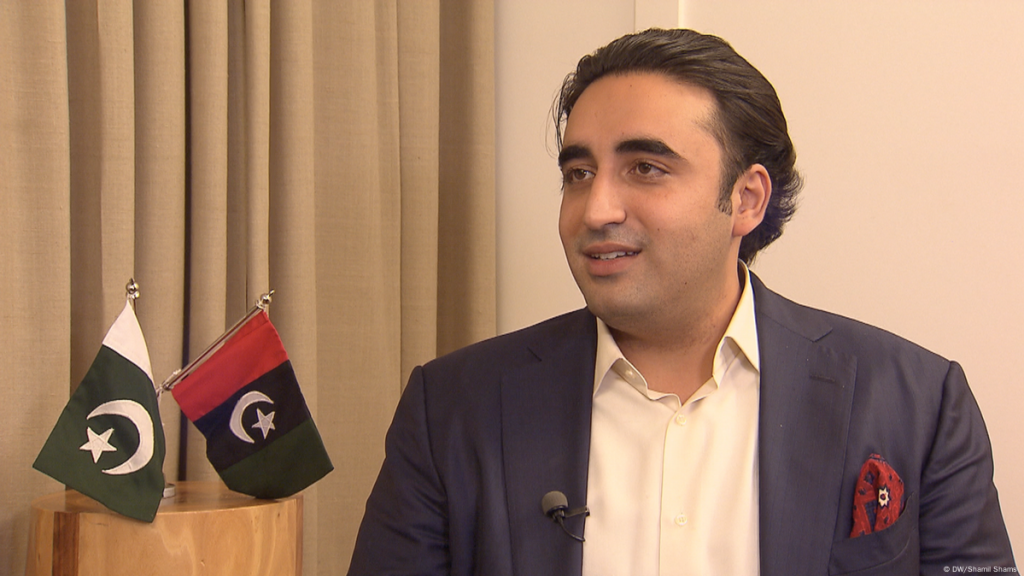Bilawal stresses judicial independence, free journalism at Oxford.
PPP chief defends PPP’s stance on 26th Amendment, Peca law.
Party had voiced its opposition where necessary, he clarifies.
LONDON: Putting his weight behind a democratic future for the country, Pakistan Peoples Pakistan (PPP) Chairman Bilawal Bhutto-Zardari has said that the nation does not deserve another military coup.
“The people of Pakistan are right to demand a better future [….] They certainly do not deserve another military coup,” Bilawal said while delivering the Annual Benazir Bhutto Memorial Lecture at the Oxford Union.
The former foreign minister further emphasised the importance of democratic governance, an independent judiciary, and free journalism as essential to the country’s future.
Paying homage to his slain mother and the country’s ex-prime minister Benazir Bhutto, Bilawal termed her an extraordinary woman who advanced the idea that “democracy is the best revenge”, not a personal vendetta.
The lecture comes against the backdrop of the fact that 48 years ago this term, Benazir Bhutto (ex-president, Lady Margaret Hall) made history as the first female Asian President of the Oxford Union.
Leading in Hilary Term 1977, she shattered barriers and championed diversity in leadership and later became the first woman to lead a Muslim-majority nation, dedicating her life to democracy, equality, and justice.
The Oxford Union said it was proudly hosting this annual lecture to celebrate Benazir’s enduring influence and to pay tribute to the ex-PM’s remarkable legacy.
Speaking at the prestigious university, Bilawal praised his mother’s dedication to democracy and resilience against patriarchal challenges and several odds she faced throughout her career including several assassinations in her family — and her own killing in Rawalpindi.
“My mother Benazir came to Oxford at the age of 16 to study and then returned to Pakistan at 25 to enter politics,” the PPP chief said, adding, “She was an extraordinary woman who paved the way for women in leadership despite societal restrictions.”
He also highlighted her achievements as Pakistan’s first female prime minister and her influence on the country’s progress in appointing women to key positions, including foreign minister, chief minister, and speaker of the National Assembly.
During the wide-ranging address, Bilawal also defended Pakistan’s nuclear programme, criticising what he called Western double standards on nuclear weapons.
“I am struck by the hypocrisy. What are the rules that make one entitled to a missile or a nuclear weapon? Is it that every Western or white country is allowed nuclear weapons and others aren’t? Pakistan’s [nuclear doctrine] is not an aggressive nuclear weapon programme,” he said.
He also took a veiled swipe at the US president, saying: “We don’t have an expansionist policy to take over the Panama Canal or conquer Canada. Our nuclear weapons are only for self-defence.”
Expressing concern over US sanctions on Pakistan’s ballistic missile programme, Bilawal questioned who has the authority to define a nation’s defence capabilities when the country is in full compliance with international laws.
Meanwhile, Oxford University President Israr Khan moderated a question-and-answer session after the main lecture where Bilawal responded to questions about human rights and democratic challenges in Pakistan.
He acknowledged that even established democracies face issues and defended the PPP’s stance on controversial legislation such as the 26th Amendment and the Prevention of Electronic Crimes Act (Peca), saying that the party had voiced its opposition where necessary.
It is pertinent to know that past speakers have included Theresa May and David Cameron (former UK prime ministers), Salome Zourabichvili (President of Georgia) and Nancy Pelosi (former US House speaker).

